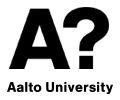Pre-conference workshops on Wednesday November 1
Please check your way to the workshops. They will be held in the Aalto University main building (see the link), hence NOT in the Design factory.
12:00 – 15:00, Aalto University main building, room Y225a (Riihi) check your way to the workshops
Building Bayesian networks
Sakari Kuikka, Inari Helle (University of Helsinki)
The workshop will give a short introduction to how to build Bayesian networks. Bayesian networks (BNs) are graphical models which consist of variables relevant to the system and probabilistic dependencies between the variables. BNs are applied e.g. in classification problems as well as in risk and decision analysis. Model structure can be learned from data, or it can be based on subject-matter knowledge. The latter option is typically more suitable for decision analysis where there is a need to express causality with a network of causes and effects. The probability distributions that quantify the relationships between the variables can be based on various sources of information including observational data, simulation results generated with other models, and expert knowledge. In the workshop, an example model will be built which demonstrates both the features of the software and the basic ideas of Bayesian networks. Participants can load the Hugin Lite software to be used in the demonstration.
12:00 – 15:00, Aalto University main building, room Y309b check your way to the workshops
How to use expert knowledge elicitation in risk and uncertainty assessment?
Olaf Mosbach-Schultz (European Food Safety Authority)
The European Food Safety Authority adopted the ‘Open EFSA’ approach, which aspires to improve the scientific assessments done by EFSAs panels.
Three separate but closely related guidance documents are developed on the assessment of uncertainty (draft for internal testing [2016], the weight of evidence [2017] and biological relevance [2017]), which should support the panels in their work.
The use of expert knowledge elicitation is an essential tool within the assessments. The workshop will show how the scientific assessments are structured, expert judgements are integrated and performed, and finally the results are communicated. Participants will be asked to re-frame typical risk assessment questions, perform quantitative judgements, and interpret results.
15:30 – 18:30, Aalto University main building, room Y225a (Riihi) check your way to the workshops
Security – from concept to management
Sissel Haugdal Jore (University of Stavanger), Per Gustafson (Lund University)
Increased focus on protection from terrorism and other intentional malicious crimes has led to increasingly academic and practical interest in the topic of security. In parallel with this societal development, “new” concepts such as security culture, security risk analysis and security management have appeared and these issues have become the responsibility of multiple actors in society including private and public organizations -but what do these concepts mean in the context of security? In the workshop, the academic and practical challengers and possibilities for achieving security will be accounted for and discussed. The workshop includes lectures, case study examples and discussions among the participants.
15:30 – 18:30, Aalto University main building, room Y309b check your way to the workshops
Probability bounds analysis: getting something from hardly anything
Scott Ferson (University of Liverpool)
This three-hour workshop introduces probability bounds analysis for developing fully probabilistic risk analyses when little or no empirical data are available. The presentation will be casual and interactive, and workshop will feature hands-on examples worked in R on your own laptop, from raw data to final decision. You can work the examples yourself, or just follow along if you prefer. The examples illustrate the basic problems risk analysts face: not having much data to estimate inputs, not knowing the distribution shapes, not knowing their correlations, and not being sure about the model form. Probability boxes will be developed from both large and small data sets, from data with non-negligible measurement uncertainty, and from published summaries that lack data altogether. Emphasis will be placed on the interpretation of results and on how defensible decisions can be made even when little information is available.
Contacts:
Ullrika Sahlin ullrika.sahlin@cec.lu.se
Edoardo Tosoni edoardo.tosoni@aalto.fi

